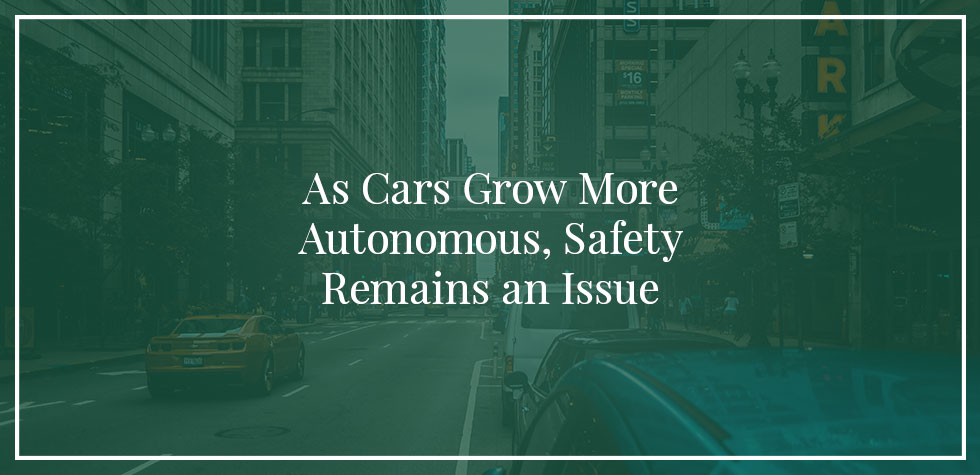By 2021, all major car manufacturers will offer some version of an autonomous vehicle (AV). Already, cars like the Tesla Model 3 and Audi’s A8 offer autonomous functionality. At the same time, rideshare companies like Uber are testing self-driving vehicles, Ford is partnering with food delivery companies like Domino’s and Postmates, and Waymo (Google) has been granted permission to transport people in robo-taxis in the state of California.
But while AVs are undoubtedly a huge leap in innovation for the automotive industry, many questions remain around the safety of these vehicles, the role humans play, and even the nature of investigating crashes involving AVs.
Undoubtedly, the amount of litigation around AVs will increase over the next few years as more manufacturers come under pressure to both educate consumers and comply with existing motor vehicle regulations when testing these new cars. Clifford Law Offices is well-prepared to represent consumers who suffer an injury or loss as a result of an autonomous vehicle.
What Are Autonomous Vehicles?
An autonomous vehicle (AV), also known as a self-driving car, car autonomous vehicle (CAV), driverless car, robo-car, or robotic car, uses a combination of sensors, cameras, radars and artificial intelligence to move between destinations without the need of a human being. Elements of this autonomy are found in everything from your GPS navigation system to functions that enable a car to park itself.
Fully AVs that need no human intervention to operate are not yet common on the road—though they will be. The National Highway Traffic Safety Administration (NHTSA) currently has six levels of driver assistance technology advancements through which auto manufacturers are currently progressing as they move towards that future:
- No automation: the driver performs all driving tasks.
- Driver assistance: the driver controls the vehicle but some tasks are automated.
- Partial automation: the vehicle has some automated functions, like steering, but the driver must remain engaged.
- Conditional automation: the driver must be present but is not required to be engaged at all times.
- High automation: the vehicle can perform all driving functions under certain conditions.
- Full automation: the vehicle can perform all driving functions under all conditions.
Fully AVs that drive us instead of the other way around will, according to the NHTSA, “become a reality” in the future.
Are Autonomous Vehicles Safe?
With 94 percent of auto accidents due to human error, safety is touted as one of the main benefits of AVs. A common argument in favor of AVs is that automating more pieces of the driving experience will lower the risk of crashes. But while AVs might lessen the chances of a driver causing the accident, they potentially increase the chance for product defects to occur and cause dangers of their own.
For example, in 2018 a man died in a crash involving a Tesla vehicle in San Mateo, California. News reports noted that Autopilot, the self-driving function in Tesla cars, was active in the moments leading up to the crash, and that the victim had taken the car to a dealer multiple times claiming the function kept steering the car toward the highway divider into which it eventually crashed. In June of 2019, the National Transportation Safety Board (NTSB) released a preliminary report attributing the crash to a navigation mistake by Autopilot.
There are a growing number of cases like the one above that highlight the challenges of bringing AVs to market. Not only must vehicles be safe to ride in, manufacturers must also address defects quickly and ensure they are clear with their customers about any potential risks involved with self-driving cars. And manufacturers must communicate these risks clearly and effectively with the people to whom they sell their products, so that consumers can make the most informed decision possible for themselves and their families.
No car, however technologically advanced, will ever be 100 percent safe to ride in. But in addition to touting the benefits of AVs, car companies, government bodies, and others should also make it a priority to be as open as possible about the challenges the industry still faces. True transparency could contribute to smarter consumers and fewer accidents related to AVs.
Your Right to Compensation
While autonomous vehicle legislation is relatively new, this area is the law on the rise. So far, 29 states, including Illinois, have enacted legislation around regulating AVs. But cases concerning these statutes are likely to get more complex in the future, not less. Instead of human error, these cases involve machines failing to interpret signals and sensors, and require computer science and data analytic expertise to properly investigate. Law firms and attorneys representing these cases must have the resources and ability to access and provide that kind of knowledge moving forward to help victims receive due compensation.
Clifford Law Offices takes the issues around self-driving vehicles very seriously, helping clients receive the compensation they deserve for losses suffered, whether that is physical injuries, damaged property, or emotional trauma. If you or a loved one has been involved in a crash involving an AV, our experienced attorneys are waiting to help. Please reach out to our Chicago car accident attorneys today to have your questions answered.

